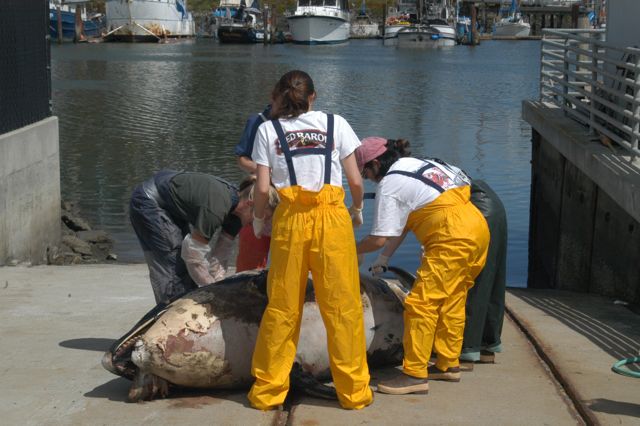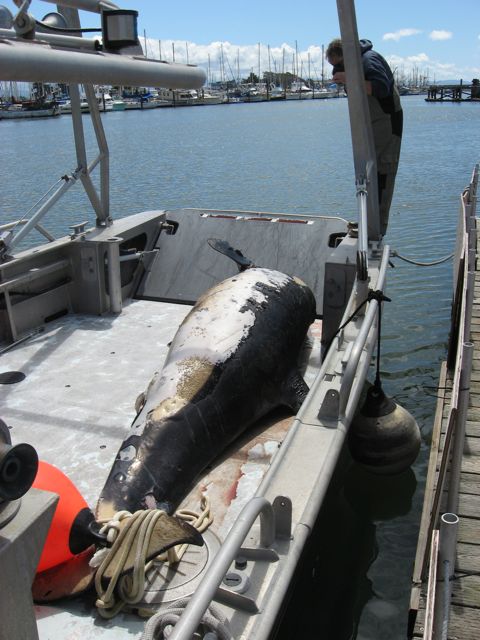
by Collen Young, Vertebrate Ecology Lab
Did you know that Vertebrate Ecology Lab (VEL) at MLML is part of the National Marine Mammal Stranding Network? As Stranding Network participants, we collect data on pinnipeds (seals and sea lions) and cetaceans (whales and dolphins) that wash up dead (strand) on beaches in Monterey County. By keeping track of the local strandings, we can determine baseline estimates of what’s “normal,” allowing us to identify “unusual mortality events,” when more animals than usual strand. We rely 100% on the general public (you!) to report dead marine mammals that are on the beach, so if you see one, give us a call…you may present us with an opportunity to learn about a rare or poorly studied species, like the killer whale that was called in earlier this month!
On Sunday, April 5, residents in a community south of Carmel found a dead killer whale floating in their cove. Luckily, they knew to call us, and we went out that afternoon to investigate. Upon arrival, our team determined that the animal was a female, juvenile killer whale, probably about 1 year old. There were no obvious external clues about the cause of death, so we decided to anchor the carcass and come back the next day to get a closer look.
Monday we came armed to collect some serious data. The animal had been washed onto some rocks, and was no longer floating, allowing us to take a variety of measurements and a skin sample. Unfortunately, the ocean conditions were too rough to bring the animal by boat back to Moss Landing for further examination, but still got some valuable data.

Once word broke out that we had a killer whale, researchers all over the Pacific Northwest started requesting samples. Given the great number of researchers who would benefit from getting more samples, we decided to pull out all the stops to get the animal back to Moss Landing for a necropsy (an animal autopsy).
On Tuesday we went back to the animal and attached a buoy around a caudal peduncle (the area right before the tale). The ocean still wasn’t cooperating with us to allow transport back to MLML, so we wanted to make sure we could re-locate the animal the next day.
Finally, on Wednesday, the ocean had slightly calmed, so we decided to retrieve the killer whale. A team of snorkelers swam the animal out of the cove to a waiting rigid-hulled inflatable boat (rhib), which towed the carcass until meeting up with MLML’s aluminum front-loader, the Shiela B. We transferred the animal to the deck of the Shiela B, and she sped off towards the team of researchers eagerly awaiting her arrival.
In about 3 hours, with the help of a marine mammal veterinarian, and several students from the VEL, the killer whale was fully necropsied. We obtained tissue and organ samples, measurements of blubber and muscle thickness, and other important data. Samples have been mailed all over the west coast of the US for further processing to try to figure out why this young whale died.
While we await the results, the VEL is standing by to investigate other marine mammal stranding incidents in Monterey County. Please help us stay informed about dead stranded marine mammals by calling 831-771-4422 if you see one!


